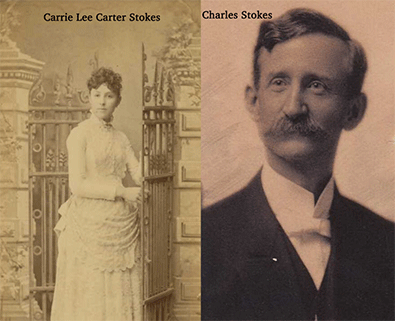In 1866, one of Dexter’s most interesting and influential citizens was born near Bloomfield, Missouri – Carrie Lee Carter. Carrie Lee Carter’s family hailed from Tennessee before moving to Bloomfield just before the Civil War. Her father, Alison E. Carter was a merchant and served in the pro-Confederate Missouri State Guard during the war. After the Civil War, the Carters moved near Dexter, where Carrie began school until she was old enough to be sent to St. Louis, where she attended primary school. Upon graduation, she enrolled in the Cumberland Female College in McMinnville, Tennessee. After college she returned to Dexter, where she taught for a few years before she was accepted and attended the Beethoven Conservatory in Saint Louis. She returned to Dexter where she taught music and joined the local chapter of the Woman’s Christian Temperance Union (WCTU). The WCTU was formed in Cleveland, Ohio in 1874 by middle class women who believed that alcohol was the source of many hardships experienced by families. The goal of the WCTU was to educate and reform the public on the evils of alcohol use. By 1900, the WCTU was the largest temperance and women’s rights organization in the country. The WCTU was active in almost every social welfare movement in its time, including education, healthcare, and women’s suffrage.
Carrie Lee Carter quickly became a rising star in the local and state organization of the WCTU. She was first elected as secretary of Dexter’s WCTU, and quickly rose through the ranks to become a convention delegate and then president of the 14th congressional district before she was twenty-five years old. By the 1890s, she traveled the state making speeches and forming new chapters of the WCTU. She quickly became known for her emotional speeches and untiring work ethic. She told one crowd during a speech that, “Every year from now till doomsday, let us continue the fight, alternating each year with attacks through the initiative and the legislature until victory comes.”
Carter was sent on a speaking tour in the late 1890s throughout the American West. Speeches made in California, Arizona, Nevada, and Utah were met with standing ovations and more invitations to speak. During the World’s Fair in 1904, she managed the WCTU’s official temperance hotel in St. Louis. She spoke at Chautauquas, Civil War reunions, and county fairs throughout the country. After the death of longtime state president, Clara Hoffman, Carter was elected president of the Missouri WCTU. During her tenure as president, she pushed for a constitutional amendment that prohibited alcohol in Missouri. In 1905 she even directly went after Missouri Governor Joseph Folk after she saw him take a drink of alcohol in public.
Temperance was not Carrie Lee Carter’s only cause during her time with the WCTU. Beginning in 1893, she spoke in favor of suffrage throughout southeast Missouri. She argued that suffrage was successful in states like Colorado and argued that Missouri should also pass a suffrage amendment that granted women the right to vote. In 1909 she helped organize a march on the state capital in Jefferson City to lobby legislators to pass a suffrage amendment. The amendment failed, but her speeches catapulted her into national prominence within the WCTU. By the time the passage of the 19th Amendment was near, she made speeches entitled, “Votes for Women,” and “My Duty at the Ballot Box.” Her name became nearly as common as the likes of suffragettes, Susan B. Anthony and Elizabeth Caty Stanton.
In 1904, Carrie Lee Carter began dating reformer and newspaper man, Charles Stokes. Stokes was no stranger to Carter; both had been raised in Dexter where the former became one of the city’s first mayors and owner of the Dexter Messenger. After failed bids to represent Stoddard County in the state legislature, Stokes moved first to Mexico, Missouri and then to Jackson County where he ran two newspapers in Kansas City. It was while Carrie was in Kansas City that she began her relationship with Stokes, the two being married in June 1905. In Kansas City, Stokes ran for governor twice on the Prohibition ticket, but was soundly defeated. After his defeat, Stokes devoted most of his time to supporting his wife and her efforts at reform. In 1913, the couple moved to southern California, but returned often to southeast Missouri and Dexter to organize speeches and lectures in favor of prohibition and suffrage. Carrie Lee Carter Stokes read newspapers from Dexter that announced the passage of the 18th and 19th Amendments in 1919.
As she became older, Carrie Stokes made fewer and fewer speeches, but made enough time to be president of the Los Angeles WCTU and president of the Los Angeles County Women’s Prohibition Club. During this time, she put most of her energy into helping her progressive husband publish two prohibition newspapers. She wrote and edited articles that supported temperance, voting rights, and world peace. On May 13, 1936, Carrie Lee Carter Stokes died near Los Angeles, California. Her body was cremated and returned to her beloved hometown of Dexter, Missouri for burial. After her death, Charles Stokes wrote a small biography that detailed the many crusades his wife waged entitled, Press and Pen Portraits. Fearing that her legacy would be forgotten, Stokes made a large donation to the Dexter library to ensure that her name and her causes lived on. Charles Stokes died in 1943, the pair are buried next to one another in the Dexter Cemetery.
Nearly eighty-seven years later the name Carrie Lee Carter Stokes is all but forgotten by Dexterites, but many people outside of our region not only know who she was but celebrate her contributions to social reform during the late 19th and early 20th centuries. In a world that was mostly dominated by men, Carrie Lee Carter Stokes became a symbol of a changing world – a glimpse into the future of not only Dexter, but society as a whole.
(A future article will be made about her brother, Albert H. Carter, one of Dexter’s founding business leaders)

